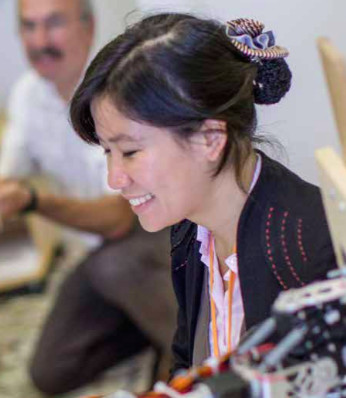Lecturer: Sao Mai Nguyen
Fields: Machine learning, robot learning, reinforcement learning, goal babbling, active imitation learning
Content
This course will provide an overview of research in machine learning and robotics of artificial curiosity. Also referred to as intrinsic motivation, this stream of algorithms inspired by theories of developmental psychology allow artificial agents to learn more autonomously, especially in stochastic high-dimensional environments, for redundant tasks, for multi-task, life-long or curriculum learning. The course will cover the following topics:
- Basis of reinforcement learning
- Curiosity-driven exploration
- Goal babbling
- Intrinsic motivation for imitation learning
Objectives
The students will learn about the different uses of intrinsic motivation for motor control, and see several illustrations of application and implementation of intrinsically motivated exploration algorithms for motor control by embodied agents. They will also understand the importance of data sampling, exploration and source of information selection for robot learning. They will also have a practical experience on a simple robotic simulation setup.
Literature
- J. Schmidhuber. Formal theory of creativity, fun, and intrinsic motivation (1990-2010). IEEE Transactions on Autonomous Mental Development, 2(3):230–247, 2010. https://doi.org/10.1109/TAMD.2010.2056368
- G. Baldassarre. What are intrinsic motivations? a biological perspective. In Development and Learning (ICDL), 2011 IEEE International Conference on, volume 2, pages 1–8. IEEE, 2011. https://doi.org/10.1109/DEVLRN.2011.6037367
- J. Gottlieb and P.-Y. Oudeyer. Towards a neuroscience of active sampling and curiosity. Nature Reviews Neuroscience, 19(12):758–770, 2018. https://doi.org/10.1038/s41583-018-0078-0
- P.-Y. Oudeyer. The New Science of Curiosity, chapter Computational Theories of Curiosity-Driven Learning. NOVA, 02 2018. https://arxiv.org/abs/1802.10546
Lecturer

Nguyen Sao Mai specialises in robotic learning, especially cognitive developmental learning. She is currently an associate professor at the UI2S Lab at Ensta Paris, France, after a few years in IMT Atlantique. She received a PhD in 2013 in computer science, for her studies on how to combine curiosity-driven exploration and socially guided exploration for multi-task learning and curriculum learning. She holds a master’s degree in computer science from Ecole Polytechnique and a master’s degree in adaptive machine systems from Osaka University. She has coordinated of the experiment KERAAL, funded by the European Union through project ECHORD++, which proposes an intelligent tutoring humanoid robot for physical rehabilitation. She is currently associate editor of IEEE TCDS and co-chair of the Task force “Action and Perception” du IEEE Technical Committee on Cognitive and Developmental Systems.
Affiliation: Ensta Paris
Website: http://nguyensmai.free.fr/